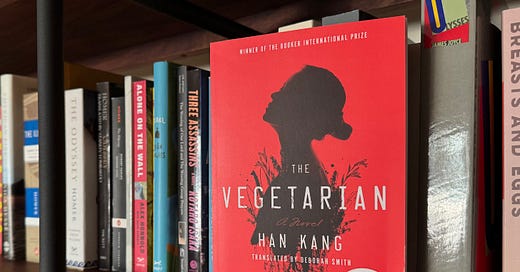Kang, Han. The Vegetarian. Translated by Deborah Smith. New York: Hogarth, 2018. 185pp. $17.00
The Vegetarian by the most recent Nobel Laurate in Literature, Han Kang, is a good novel. A hot take, I know. But I don’t mean that it’s necessarily a pleasant read because this is a book about people who feel ugly feelings.
Kang initially composed the three parts of The Vegetarian as separate novelettes, each with a new narrator, who feels things about the titular vegetarian, Yeong-hye. Each part orbits Yeong-hye as the narrators futilely attempt to understand her. The reader is similarly frustrated; we are never given direct access to her own thoughts. She remains as opaque to the reader as she does to each narrator.
Kang cleverly subverts the novel form, which generally promises unfettered psychologic access to the main character, who must be Yeong-hye. She is the constant, the title character, which leads us to believe we’ll have some sort of intimacy with the vegetarian, but Yeong-hye remains aloof of us.
The novel isn’t interested in how Yeong-hye justifies her decision to stop eating meat. It’s enough that she made the choice herself. Rather, this is a novel about society’s totalizing pressures against the individual. Kang forces each narrator – Yeong-hye’s husband, brother-in-law, and sister in succession – to justify to themselves why they expect certain things of Yeong-hye.
The closest we get to Yeong-hye’s voice are snippets of prose interspersed in her husband’s narration that describe the evolving dream that induces Yeong-hye’s dietary change. But Kang never condescends to explain these nightmares, so they leave the reader feeling no more informed about Yeong-hye. She stays stubbornly taciturn. Perhaps Yeong-hye writes the reader off, as she does so many other characters, since they will never understand her decision.
If this novel has a thesis, Yeong-hye’s older sister In-hye offers it to us towards the end of our time with her: ‘It’s your body, you can treat it however you please. The only area where you’re free to do just as you like. And even that doesn’t turn out how you wanted.’
Is In-hye addressing her sister? Us? A more encompassing generic you? The society of The Vegetarian seems incapable of accepting Yeong-hye’s decision to stop eating meat, but what would it mean to give Yeong-hye her choice and yet continue to systematically deprive the chickens, cows, and pigs we eat their autonomy?
Frequently, the boundary between Yeong-hye and the non-human world is unclear. Her husband describes a moment when ‘[his] wife growled’ and ‘An animal cry of distress burst from her lips.’ Yeong-hye repeatedly shucks off her clothes and hospital gowns, clearly rejecting the veneers and labels society tries to dress her with. During In-hye’s narration, Yeong-hye seems to desire to become a tree, and Yeong-hye only seems fully comfortable in her skin when it’s been painted with flowers.
It’s tempting to try to pathologize Yeong-hye, but Kang shrewdly places much of the drama of the novel within the ambit of Yeong-hye’s psychiatric care as if the author is daring us to do so. But by trying to pin her down with the language of psychology, which has a history of pathologizing femininity (cf. hysteria), we end up doing the selfsame violence that’s enacted upon her by other characters.
Rather, Yeong-hye is always a body in motion, in the act of becoming. Deleuze and Guattari note that ‘the self is only a threshold, a door, a becoming between multiplicities.’ The self is never fixed; it can only be understood in momentary instantiations. Instead, ‘What is real is the becoming itself...not the supposedly fixed terms [i.e. beings] through which that which becomes passes.’
While all three narrators have vastly different postures towards Yeong-hye, there is one consistency: her becomings induce discomfort in all them. She disrupts their tidy stories – which is to say, our stories – about what it means to be a civilized human being. They also all come to different emotional conclusions about Yeong-hye but not necessarily ones that represent any kind of growth.
In-hye can admit that like her sister she has dreams, but she cuts off the dream’s becoming, saying ‘We have to wake up at some point.’ Though she is the most willing accept her sister on Yeong-hye’s terms, In-hye is still terrified of the possibility that the dreamworld is realer than her waking life, terrified of what that might mean.
In-hye may come to the healthiest conclusion, but her inability to embrace the awakenings, which her nearness to Yeong-hye threatens, suggests that she is still in the throes of the societal story of sisterhood and motherhood. Moreover, Kang’s The Vegetarian suggests that ‘healthfulness’ is far more relative than we tend to want to admit.
And this is where I find myself as a reader of The Vegetarian. I can accept Yeong-hye’s character for who she is, even if only as a condition of the reading experience, but like In-hye, I can’t quite embrace what she offers. She passes out of our grasp, and resists any neat moral or didacticism.
You can support The Guardless Guard by clicking and purchasing books, movies, and other products through the affliate links above. Bookshop.org also supports local bookstores.
If you don’t purchase through me, consider checking out your library or your local used bookstore.
Hey! Thanks for reading The Guardless Guard. If you like this newsletter, please consider inflicting it upon a couple of friends.




